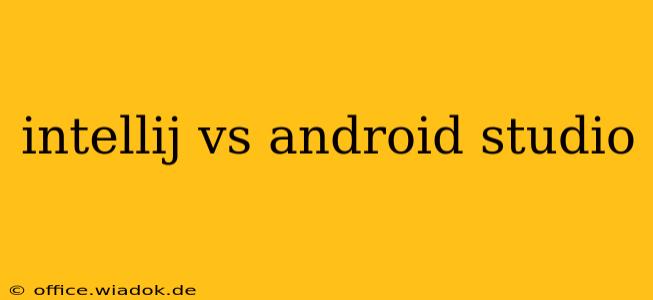Choosing the right Integrated Development Environment (IDE) can significantly impact your productivity and overall development experience. For Android developers, the choice often boils down to IntelliJ IDEA and Android Studio. While both are powerful IDEs built on the IntelliJ platform, they cater to different needs and workflows. This in-depth comparison will help you decide which IDE best suits your project requirements.
Understanding the Relationship: IntelliJ IDEA and Android Studio
It's crucial to understand that Android Studio is essentially a customized version of IntelliJ IDEA, specifically tailored for Android development. It bundles all the essential tools and features you need to build Android apps, including the Android SDK, emulators, and various Android-specific plugins. IntelliJ IDEA, on the other hand, is a more general-purpose IDE supporting a wider range of programming languages and frameworks, including Java, Kotlin, Python, and more.
Key Differences: IntelliJ IDEA vs. Android Studio
| Feature | IntelliJ IDEA | Android Studio |
|---|---|---|
| Primary Focus | General-purpose IDE | Android app development |
| Android SDK | Requires separate installation | Included by default |
| Android Tools | Requires installing Android plugins | Built-in Android-specific tools & features |
| Emulator | Requires separate emulator installation | Built-in Android emulator (AVD Manager) |
| Deployment | Requires manual configuration for Android | Simplified Android deployment workflows |
| Flexibility | Supports a wider range of programming languages | Primarily focused on Java, Kotlin, and C++ for Android |
| Learning Curve | Steeper for Android-specific functionalities | Easier for Android development |
| Size | Smaller initial download size | Larger initial download size due to included components |
When to Choose IntelliJ IDEA
IntelliJ IDEA shines when you need a versatile IDE that can handle multiple programming languages and frameworks. Here are some scenarios where IntelliJ IDEA might be the better choice:
- Backend Development: If you're working on a project involving both backend and Android development, IntelliJ IDEA's support for various server-side technologies makes it a more efficient choice. You avoid switching between different IDEs.
- Multi-Platform Projects: For projects involving multiple platforms (e.g., web, desktop, Android), IntelliJ IDEA's flexibility proves invaluable.
- Learning Multiple Languages: IntelliJ IDEA is an excellent platform for learning different programming languages and frameworks outside the Android ecosystem.
- Customizability: IntelliJ IDEA offers a higher degree of customization, allowing you to tailor the IDE to your specific preferences and needs.
When to Choose Android Studio
Android Studio is the recommended IDE for Android development. Its advantages are evident in:
- Seamless Android Development: The integrated Android SDK, emulator, and other tools streamline the development process, making it far more efficient than using IntelliJ IDEA with added plugins.
- Easier Setup: Android Studio's simplified setup process makes it ideal for beginners. You don't need to manually configure the Android SDK and other tools.
- Performance Optimizations: While not always a significant difference, Android Studio is often optimized for Android-specific tasks.
- Built-in Support: Android Studio provides direct support for all Android-specific features, libraries, and debugging tools.
Conclusion: The Right Tool for the Job
The best IDE depends entirely on your specific needs. For dedicated Android developers, Android Studio is the clear winner, offering a streamlined and efficient development environment. However, if your workflow involves multiple programming languages and platforms, or you're not solely focused on Android, IntelliJ IDEA's versatility might be a better fit. Consider your project's requirements, your programming language preferences, and your overall development goals before making your decision.

